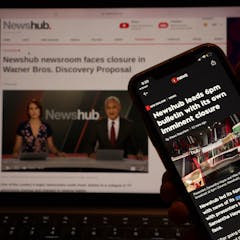
Articles on Facebook
Displaying 1 - 20 of 1000 articles

Visually appealing and cheap to produce, AI-generated images allow scammers and spammers to post high volumes of engaging content − and Facebook’s algorithm may be promoting these posts.

Four Canadian school boards are suing social media giants. This comes as 95 per cent of Ontario schools report needing more resources to support student mental health.

A new change to Meta’s apps will see users no longer recommended political content by default. The ramifications of this will be far-reaching.

New research shows that even after Facebook made changes to stem the tide of dangerous pandemic misinformation, some accounts continued to thrive.

Platforms like Facebook, Instagram and TikTok vie for our attention and boast billions of users. Ultimately, what matters is connection.

Online extremism is a unique challenge – terrorists use methods that can’t be captured by standard content moderation. So, what can we do about it?

As political parties desperately battle for voters’ attention, cybersquatting is one of many online tools in the toolkit. It’s only effective at further diminishing trust in government.

Australia needs to prioritise finding new funding to support journalism, particularly in remote and regional areas.

Calls for the Fair News Digital Bargaining Bill to be fast-tracked are misguided. A better solution would be a straight levy on digital advertising to fund public interest news production.

The news page on Facebook will go, and with it, the flow of money to some Australian media outlets. But will the news content disappear too?

Australian fans who didn’t manage to snag Eras tickets are on the hunt – and scammers are capitalising on this. Here’s everything you need to know to protect yourself.

The complex task of tackling online terror needs human eyes as well as artificial intelligence.

As legislators rail against social media companies, the companies continue to put millions of young people at risk. Here’s how − and what can be done about it.

Company layoffs can have unintended consequences, even for those spared from redundancy.

Meta’s decision to charge users for an ad-free experience still requires that people have their information collected.

Social media platforms are abandoning news – which is bad news for traditional media organisations that have come to rely on them for consumers.

Google has secured significant concessions in its deal with Ottawa over Bill C-18, the Online News Act, which comes into effect on Dec. 19.

The Supreme Court will hear five cases this term that will examine the nature of online discussion spaces run by social media platforms.

We found the number of “big lies” – also known as fake news – didn’t increase in 2023 compared to 2020. But we did spot more “small lies” this time. Here’s what to look out for in coming elections.

Facebook and Instagram users in some parts of the world can now pay for an ad-free experience – but at what price?
